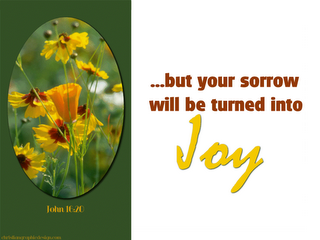
Thursday in the 6th Week of Easter
Jn 16:16-20
There are two kinds of sorrow. The first kind of sorrow is the sorrow that imprisons. The second kind of sorrow is the sorrow that sets free.
The sorrow that imprisons is the kind of sorrow that leads nowhere except to a sustained or, if not, to an even greater sorrow. We experience or suffer this kind of sorrow when we surrender our selves to sorrow itself. When we allow our selves to be tied down by the mistakes or sins we have committed in the past, we go through this kind of sorrow. When we let some unfortunate circumstances in our lives rub us of our belief in grace and our hope for a better tomorrow, we suffer this kind of sorrow. When we refuse to let go of our hurts and, thereby, deprive our selves of growing unto full maturity, we are enslaved by this kind of sorrow.
The sorrow that sets free is the kind of sorrow that is only but a prelude to joy. This sorrow is like the discomfort a mother may experience in delivering a new bundle of joy into the world. This sorrow is like the anxiety of a parent that has to let go of his or her child at the proper time so that the child may start a life of its own. This sorrow is like the struggles that a student has to go through before reaching graduation day. This sorrow is like the hard demands of discipline that creates a sturdy character. This sorrow is like the remorse of a penitent that leads to contrition and forgiveness. This sorrow is like dying to one’s self, like the grain of wheat that falls to the earth and dies, so that it may bear abundant fruit. This sorrow is like physical death in itself that signifies birth into eternal life.
While there is no life without sorrows, we can choose which of the two kinds of sorrow we wish to endure. Most importantly, we can choose for whom and to whom we want to offer our sorrows in life.
The departure of Jesus from their sight caused the disciples great sorrow. Theirs was the sorrow of letting go. But it was the kind of sorrow that set them free. After the Ascension, the disciples were challenged not to be dependent on the physical presence of the Lord. They had to live by faith. And it is that faith that turned their sorrow into joy and sustained it even unto martyrdom. May we have that same faith, the kind that turns sorrow into joy.
Jn 16:16-20
There are two kinds of sorrow. The first kind of sorrow is the sorrow that imprisons. The second kind of sorrow is the sorrow that sets free.
The sorrow that imprisons is the kind of sorrow that leads nowhere except to a sustained or, if not, to an even greater sorrow. We experience or suffer this kind of sorrow when we surrender our selves to sorrow itself. When we allow our selves to be tied down by the mistakes or sins we have committed in the past, we go through this kind of sorrow. When we let some unfortunate circumstances in our lives rub us of our belief in grace and our hope for a better tomorrow, we suffer this kind of sorrow. When we refuse to let go of our hurts and, thereby, deprive our selves of growing unto full maturity, we are enslaved by this kind of sorrow.
The sorrow that sets free is the kind of sorrow that is only but a prelude to joy. This sorrow is like the discomfort a mother may experience in delivering a new bundle of joy into the world. This sorrow is like the anxiety of a parent that has to let go of his or her child at the proper time so that the child may start a life of its own. This sorrow is like the struggles that a student has to go through before reaching graduation day. This sorrow is like the hard demands of discipline that creates a sturdy character. This sorrow is like the remorse of a penitent that leads to contrition and forgiveness. This sorrow is like dying to one’s self, like the grain of wheat that falls to the earth and dies, so that it may bear abundant fruit. This sorrow is like physical death in itself that signifies birth into eternal life.
While there is no life without sorrows, we can choose which of the two kinds of sorrow we wish to endure. Most importantly, we can choose for whom and to whom we want to offer our sorrows in life.
The departure of Jesus from their sight caused the disciples great sorrow. Theirs was the sorrow of letting go. But it was the kind of sorrow that set them free. After the Ascension, the disciples were challenged not to be dependent on the physical presence of the Lord. They had to live by faith. And it is that faith that turned their sorrow into joy and sustained it even unto martyrdom. May we have that same faith, the kind that turns sorrow into joy.
Lord Jesus, departing from some you love is really very painful but there are reasons why this things / circumstances happen. Help us that we will turn our sorrow into joy and your presence with our strong faith, we will rely on you. Thank you Jesus for bring to our lives your Mother, our Mother.
ReplyDeleteGod bless po...